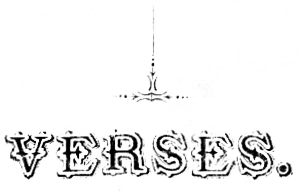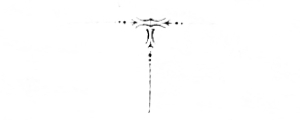In our town there dwelt a maiden
Whom the folk called Marian;
In her narrow gabled casement
All day long she sat and span.
Till a gentleman came riding
Through our town one Summer day,
Spied May Marian at the casement,
Stole her silly heart away.
Then she up and left her spinning,
Laid aside her russet gown,
In a footboy’s cap and mantle
Followed him to London town.
There he led her to a mansion
Standing by the river side;
“In that mansion dwells the lady
Who is my betrothed bride;
“Gif thou’lt be her serving-maiden,
Thou shalt wear a braw red gown,{14}
Follow her to mass on Sunday
Through the streets of London town;
“But if thou’lt not be her maiden,
Turn about and get thee home;
’Tis not meet that country wenches
Through the city here should roam.”
Not a word in answer spake she;
Weeping sore she turned away,
And alone she gat her homeward,
Travelling till the fall of day.
To our town she came at gloaming,
Softly tirled she at the door;
Whispered: “let me in, sweet mother,
I will wander never more.”
“I will turn me to my spinning,
I will don my russet gown;
Home is best for country lasses,
Men are false in London town.”
But the door was shut against her,
To her prayer came answer none.
All night long alone she wandered,
Wandered weeping through our town.
But at dawn she was aweary—
In the street she laid her down;{15}
And they found her dead at sunrise
With her head upon a stone.




![[Decorative image unavailable.]](images/i_006.jpg)
![[Decorative image unavailable.]](images/i_007a.jpg)
![[Decorative image unavailable.]](images/i_007b.jpg)
![[Decorative image unavailable.]](images/i_008a.jpg)
![[Decorative image unavailable.]](images/i_008b.jpg)
![[Decorative image unavailable.]](images/i_009a.jpg)
![[Decorative image unavailable.]](images/i_009b.jpg)
![[Decorative image unavailable.]](images/i_014a.jpg)
![[Decorative image unavailable.]](images/i_014b.jpg)
![[Decorative image unavailable.]](images/i_016.jpg)
![[Decorative image unavailable.]](images/i_019.jpg)
![[Decorative image unavailable.]](images/i_020a.jpg)
![[Decorative image unavailable.]](images/i_020b.jpg)
![[Decorative image unavailable.]](images/i_021a.jpg)
![[Decorative image unavailable.]](images/i_021b.jpg)
![[Decorative image unavailable.]](images/i_024a.jpg)
![[Decorative image unavailable.]](images/i_024b.jpg)
![[Decorative image unavailable.]](images/i_025a.jpg)
![[Decorative image unavailable.]](images/i_025b.jpg)
![[Decorative image unavailable.]](images/i_027.jpg)
![[Decorative image unavailable.]](images/i_028a.jpg)
![[Decorative image unavailable.]](images/i_028b.jpg)
![[Decorative image unavailable.]](images/i_030.jpg)
![[Decorative image unavailable.]](images/i_031a.jpg)
![[Decorative image unavailable.]](images/i_031b.jpg)
![[Decorative image unavailable.]](images/i_032.jpg)
![[Decorative image unavailable.]](images/i_032.jpg)
![[Decorative image unavailable.]](images/i_033.jpg)
![[Decorative image unavailable.]](images/i_033.jpg)
![[Decorative image unavailable.]](images/i_034a.jpg)
![[Decorative image unavailable.]](images/i_034b.jpg)
![[Decorative image unavailable.]](images/i_036.jpg)
![[Decorative image unavailable.]](images/i_037a.jpg)
![[Decorative image unavailable.]](images/i_037b.jpg)
![[Decorative image unavailable.]](images/i_038a.jpg)
![[Decorative image unavailable.]](images/i_038b.jpg)
![[Decorative image unavailable.]](images/i_041.jpg)